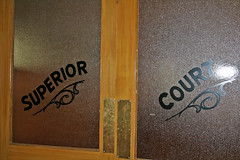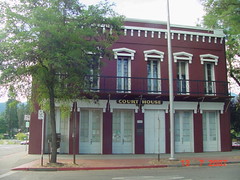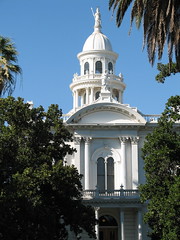Mediation is a flexible dispute resolution system that can be used to resolve virtually any type of dispute. Mediation enables the parties to work together and keeps them in control of the decision making process (and usually free from lawyers, judges, arbitrators, or inflexible laws, court rules and procedures). Since mediation is nonadversarial, it also allows the parties to achieve a "win-win" outcome, in contrast to the winner-and-loser scenarios associated with litigation and arbitration. Another advantage of mediation is that it is a private and confidential process; the discussions and agreements resulting from the mediation are not part of a public record as they are in litigation.
Friday, December 19, 2008
Sunday, December 14, 2008
Mediation Fee Update California
Trial Court Correctly Awarded Attorney's Fees To Winning Litigant In Arbitration Even Though Mediation Was Not First Attempted
Second District, Division Three Affirms Fee Award Because Contractual Fee Provision Did Not Absolutely Bar Recovery For a Failure to Mediate.
In past posts of May 30, 2008 on Lange v. Schilling and June 13, 2008 on Casillas v. Westhaven, LLC, we discussed California Association of Realtors (CAR) real estate purchase agreement forms that have a provision conditioning an award of attorney's fees on attempting to mediate before going to court or invoking arbitration rights. The appellate courts construe these clauses strictly, with Justice Fybel's decision in Frei v. Davey, 124 Cal.App.4th 1506, 1520 (2004) being one of the most cited decisions for enforcing the mediation condition precedent provisions. However, as with many disputes, "the devil is in the details"—the wording of the contractual fee clause can make all the difference in the world, as the next case illustrates.
Dewey v. Higgins, Case No. B200661 (2d Dist., Div. 3 Nov. 21, 2008) (unpublished) involved two in pro per litigants, a real estate agent and the affiliate real estate broker. Both parties agreed to arbitrate two lawsuits brought by broker against agent arising from unrelated disputes involving a commission agreement and trust deed. Agent eventually won the arbitration, with the award being confirmed as a judgment and broker ordered by the superior court to pay agent $24,584 in attorney's fees and $4,127 in costs. Broker challenged the fee award, arguing the failure to initiate mediation disqualified agent from recovering fees.
Not so, ruled the Court of Appeal,
The contractual fees clause was different from the CAR form, providing that fee entitlement was in jeopardy for not attempting mediation first "in the discretion of the arbitrator(s) or judge." The key discretionary language was what allowed the lower court to award fees even though mediation was not initiated. The fee award against broker was affirmed based on this crucial difference.
Article posted on www.calttorneyfees.com
Second District, Division Three Affirms Fee Award Because Contractual Fee Provision Did Not Absolutely Bar Recovery For a Failure to Mediate.
In past posts of May 30, 2008 on Lange v. Schilling and June 13, 2008 on Casillas v. Westhaven, LLC, we discussed California Association of Realtors (CAR) real estate purchase agreement forms that have a provision conditioning an award of attorney's fees on attempting to mediate before going to court or invoking arbitration rights. The appellate courts construe these clauses strictly, with Justice Fybel's decision in Frei v. Davey, 124 Cal.App.4th 1506, 1520 (2004) being one of the most cited decisions for enforcing the mediation condition precedent provisions. However, as with many disputes, "the devil is in the details"—the wording of the contractual fee clause can make all the difference in the world, as the next case illustrates.
Dewey v. Higgins, Case No. B200661 (2d Dist., Div. 3 Nov. 21, 2008) (unpublished) involved two in pro per litigants, a real estate agent and the affiliate real estate broker. Both parties agreed to arbitrate two lawsuits brought by broker against agent arising from unrelated disputes involving a commission agreement and trust deed. Agent eventually won the arbitration, with the award being confirmed as a judgment and broker ordered by the superior court to pay agent $24,584 in attorney's fees and $4,127 in costs. Broker challenged the fee award, arguing the failure to initiate mediation disqualified agent from recovering fees.
Not so, ruled the Court of Appeal,
The contractual fees clause was different from the CAR form, providing that fee entitlement was in jeopardy for not attempting mediation first "in the discretion of the arbitrator(s) or judge." The key discretionary language was what allowed the lower court to award fees even though mediation was not initiated. The fee award against broker was affirmed based on this crucial difference.
Article posted on www.calttorneyfees.com
Saturday, December 13, 2008
Advantages of Mediation
In a dispute mediation is an alternative to litigation. It saves Time & Money. dispute often can be settled or resolved much sooner with ADR Alternative Dispute Resolution, allowing parties to save money on attorney fees, court cost and expert fees.
In Merced County CA, the Superior Court has a $300 Early Mediation Program that is shared equally between the parties, that allows 3 hours of time with a mediator of your choice from a approved mediator list.
A "Neutral" can often assist the parties in the conflict for reaching a settlement prior to litigation.
A search for the Superior Court of each California County often will have a link to the ADR program and a list of Mediators or Arbitrators.
Many mediators will have a area of practice such as Family Law, Probate, Social Security, Real Estate, Construction Defects
In addition languages spoken such as Spanish
In Merced County CA, the Superior Court has a $300 Early Mediation Program that is shared equally between the parties, that allows 3 hours of time with a mediator of your choice from a approved mediator list.
A "Neutral" can often assist the parties in the conflict for reaching a settlement prior to litigation.
A search for the Superior Court of each California County often will have a link to the ADR program and a list of Mediators or Arbitrators.
Many mediators will have a area of practice such as Family Law, Probate, Social Security, Real Estate, Construction Defects
In addition languages spoken such as Spanish
Friday, December 12, 2008
Alternatives to Going to Trial Mediation
Did you know that most of the civil cases filed in court are resolved without going to trial?. Many people use processes other than trial to reslove their disputes. These alternative processes, known as Alternative Dispute Resolution or ADR, are typically less formal and adversarial than trial, and many use a problem-solving approch to help the parties reach agreement.
Beacuse of the potential advantages, it is worth considering using ADR before filing a lawsuit or the early stages of a lawsuit.
Mediation is one those alternatives.
Beacuse of the potential advantages, it is worth considering using ADR before filing a lawsuit or the early stages of a lawsuit.
Mediation is one those alternatives.
Wednesday, December 10, 2008
Merced County Historic Courthouse, CA
Jim W Hildreth Mediator was appointed to be a member of the Civil Mediation panel of the Merced County Superior Court ADR Program.
Jim W Hildreth looks forward in being a panel member and making contributions as a "neutral" and contributing his knowledge in real estate towards disputes involving real estate conflicts.
In addition to Merced, he is on the Civil Mediation panel with the Superior Court of Amador & Calaveras Counties.
Hildreth lives in the Historic City of Sonora.
Jim W Hildreth looks forward in being a panel member and making contributions as a "neutral" and contributing his knowledge in real estate towards disputes involving real estate conflicts.
In addition to Merced, he is on the Civil Mediation panel with the Superior Court of Amador & Calaveras Counties.
Hildreth lives in the Historic City of Sonora.
Tuesday, December 9, 2008
Tuolumne County Resolution Collaborative
The Superior Court of Tuolumne County had a open meeting to today on December 9th 2009 to discuss the initiation of a mediation program.
Potential Partners could be the courts in Tuolumne and neighboring Counties of Amador & Calaveras, School Districts, Law enforcement, DA Sheriff, community groups.
Funding, grants and the areas of application were discussed in a forum.
Jim W Hildreth, local Sonora mediator, discussed the value in small claims courts, landlord/tenant issues and the potential for merger of the already establised civil mediation panel with Amador & Calaveras County.
A report of the mediation concept will be drafted and presented in early 2009.
The concept was well recieved among partispants.
Potential Partners could be the courts in Tuolumne and neighboring Counties of Amador & Calaveras, School Districts, Law enforcement, DA Sheriff, community groups.
Funding, grants and the areas of application were discussed in a forum.
Jim W Hildreth, local Sonora mediator, discussed the value in small claims courts, landlord/tenant issues and the potential for merger of the already establised civil mediation panel with Amador & Calaveras County.
A report of the mediation concept will be drafted and presented in early 2009.
The concept was well recieved among partispants.
Monday, December 8, 2008
Amador County Mediation
The Amador County Superior Court has a active Civil Mediation Panel.
The court last month assigned a real estate easement dispute to Jim W Hildreth a mediation panel member.
The case involved multiple parties, and a trial date was set for spring of 2009.
The parties, including attorneys met in mediation and at the end of the day, decided to continue mediation for a second date.
6.5 hours latter a wriiten agreement will be produced and the outcome of the mediation will resolve the dispute and law suit.
The settlement occured for several reasons, the parties were willing to work at the dispute, the attorneys were professional and allowed the mediation to work.
The parties reached consenus and the court will have one less trial date.
The court last month assigned a real estate easement dispute to Jim W Hildreth a mediation panel member.
The case involved multiple parties, and a trial date was set for spring of 2009.
The parties, including attorneys met in mediation and at the end of the day, decided to continue mediation for a second date.
6.5 hours latter a wriiten agreement will be produced and the outcome of the mediation will resolve the dispute and law suit.
The settlement occured for several reasons, the parties were willing to work at the dispute, the attorneys were professional and allowed the mediation to work.
The parties reached consenus and the court will have one less trial date.
Subscribe to:
Posts (Atom)









